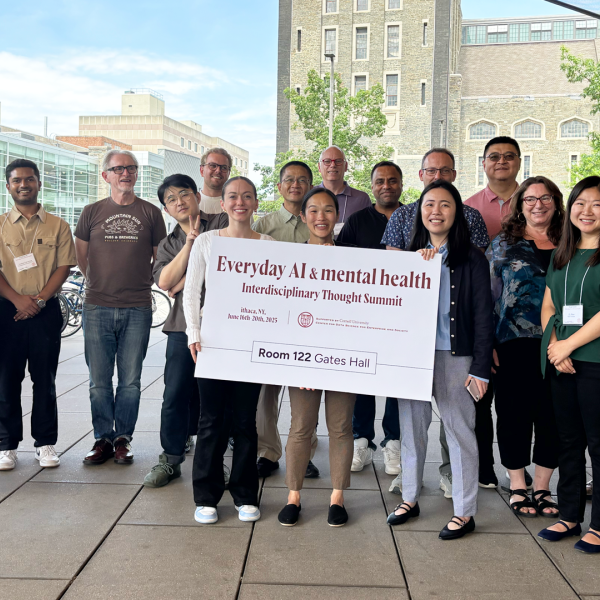July 8, 2025
By Louis DiPietro
There can be significant barriers to seeing a therapist: high costs; long waitlists, and difficulty finding a therapist who is the right fit. Tiktok users had one idea that churned up nearly 17 million posts in March alone: What about using ChatGPT as a therapist?
Qian Yang, assistant professor of information science in the Cornell Ann S. Bowers College of Computing and Information Science, sees this convergence of mental health and consumer-facing artificial intelligence into a moment of TikTok virality as a sign that a broader shift is underway.
“The line between consumer AI systems, like ChatGPT and Apple Watch, that can support well-being and clinical AI built for mental health care is increasingly blurred,” Yang said at the opening of the Cornell Thought Summit, “Everyday AI & Mental Health: Navigating a Tipping Point,” which took place June 16-20 in Gates Hall. “The potential for this integration between everyday AI that people use and the clinical AI that doctors use allows for step-by-step interventions that are more responsive to people’s everyday condition. That vision is very enticing.”
In an ideal world, consumer-facing AI, such as wearables and therapy bots that monitor a person’s health, would integrate seamlessly with a clinician’s AI-powered tools and safely transfer useful, actionable patient health data. Such integration would improve patient health and efficiency and make doctors' jobs a little easier. But we aren’t there yet, Yang said.
“It is quite complicated to build AI systems and mine insights from these mixed data sources,” she said. That, and healthcare – together with the legal, technological, and economic factors that govern it – are so complex as it is, she said.
But the gap between vision and reality didn’t stop roughly 20 leading scholars in areas like clinical machine learning, human-centered AI for mental health, law and policy, business, and economics from sketching out a pathway during the latest Thought Summit. The week-long event challenged scholars to craft a vision for the use of AI in mental health care, set priorities, and chart needed changes in areas like data, economics, and regulations, to allow for better integration of AI-powered clinical care. The summit featured several keynote talks, panel discussions, and brainstorming sessions. From these discussions, summit scholars will craft a whitepaper summarizing the group’s key findings to serve as a roadmap for AI-integrated mental health care.
Supported by the Cornell Center for Data Science for Enterprise and Society, this latest summit on mental health and AI was the third in a series occurring this past fiscal year at Cornell.
Yang co-organized the summit with three others: Fei Wang, professor and division chief of health informatics in the Department of Population Health Sciences at Weill Cornell; Tanzeem Choudhury, professor in computing and information sciences and the Roger and Joelle Burnell Chair in Integrated Health and Technology at Cornell Tech; and Angel Hsing-Chi Hwang, formerly a postdoctoral associate in the Department of Information Science at Cornell and now an assistant professor of communication at USC Annenberg.
Yang emphasized the summit’s interdisciplinary nature and noted the renowned leaders across academia, startups, and non-profits who gave keynote talks.
“Their talks triggered many discussions about how to innovate further in these aspects for bridging consumer and clinical AI,” Yang said. “Many participants said to me these wide-ranging talks were what made this summit really special and unlike any other academic workshops they’ve been to.”
Louis DiPietro is a writer for the Cornell Ann S. Bowers College of Computing and Information Science.



